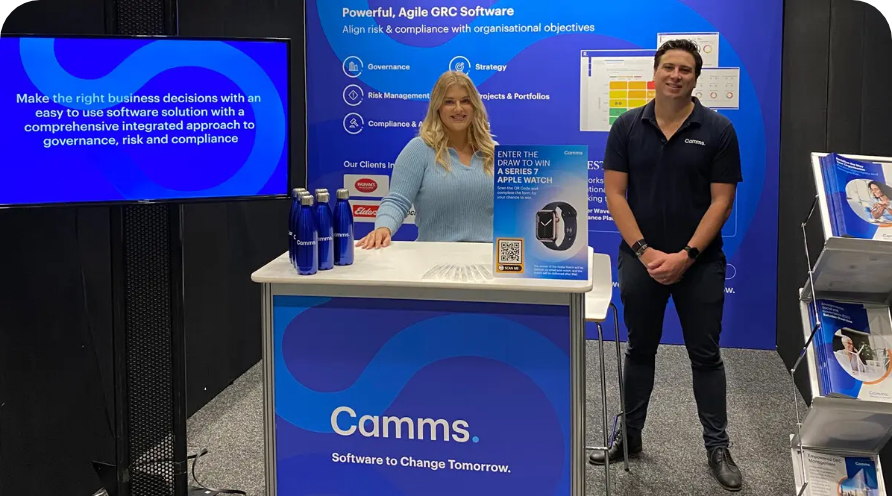Camms had the pleasure of sponsoring and being a part of the Governance Institute of Australia’s 39th National Conference! We enjoyed connecting with peers and thought leaders to exchange insights, strategies and tools to help organisations define and achieve risk management goals for their businesses! In case you missed out on this fantastic event, here’s a quick recap…
Governance Institute of Australia’s National Conference returned on the 12th and 13th of September and was staged at the Melbourne Convention Centre – the perfect location to unpack the unique ethical and moral underlays of our times and to explore how contemporary philosophies affect the Governance and Risk Management practices of a business.
Over the course of two eventful days, attendees had the opportunity to hear from the world’s most respected voices in the Governance and Risk Management arena as they delved into the continuous shift in political, economic, geopolitical and social landscapes.
Held annually, the National Conference set out to drive and underpin the stakeholder ecosystem and the value chain for businesses, governments and communities – and the way it impacts how our governance systems are framed and how we determine acceptable risk. In keeping with the times, a hybrid event was also available – allowing delegates to join via a live link through GIA’s conference platform.
Day One of the 2022 National Conference kicked off with Professor Edward Freeman, an Elise and Signe Olsson Professor of Business Administration at Darden School of Business – delivering the opening address. In another session our Chief Strategy & People Officer here at Camms, Beau Murfitt was joined by Catherine Maxwell, General Manager of Policy & Advocacy at the Governance Institute of Australia, and Gideon Van der Westhuizen, the Chief Risk Officer Bendigo & District Aboriginal Cooperative for a breakout session titled “The Risk Team as the Nerve Centre for Strategy and Decision-Making.”
The discussion centred around the strategic significance and influence of the risk manager and how risk teams have evolved to be theatres of risk and impact growth. The session particularly sought to clarify differences between uncertainty and risk by strengthening the language of risk and driving effective responses around how to provide more granular and customised insights to support strategy and decision-making for boards and management. They also explored how to embed a risk culture based on informed and ethical conduct and business values.
“We live in a high degree of uncertainty – risk management has an ability to address that uncertainty, especially from a technological point of view” noted Beau. “When we look at the impact on a business, we can see it reflected in the reduced lifespan of organisations. On the other hand, we are being challenged by changes in the natural environment, such as the two years of the pandemic and the war in Ukraine, which has had a resounding impact”.
Beau also pointed out that, “Risk and strategy teams must anticipate the future and undertake scenario planning to prepare for change. It’s important to be proactive in contributing to risk management processes and working with strategy and planning departments to map out scenarios. I have seen that done very well, and if done well, it can be pushed down within an organisation at an operational level”.
Day two on the other hand saw sessions that explored the role of investors in tackling systemic risk, how to lead a new and evolving workforce, fireside chats on modern media and conversations that matter – forces reshaping the enterprise security landscape and the legacy of the pandemic and the risks to recovery among many more.
Risk Management as a function is extremely well placed to have an impact on enabling a far-thinking organisation to be successful. To learn more about how Camms can help you redefine the way your organisation pursues opportunity and manages risk, reach out to us for a demo.





